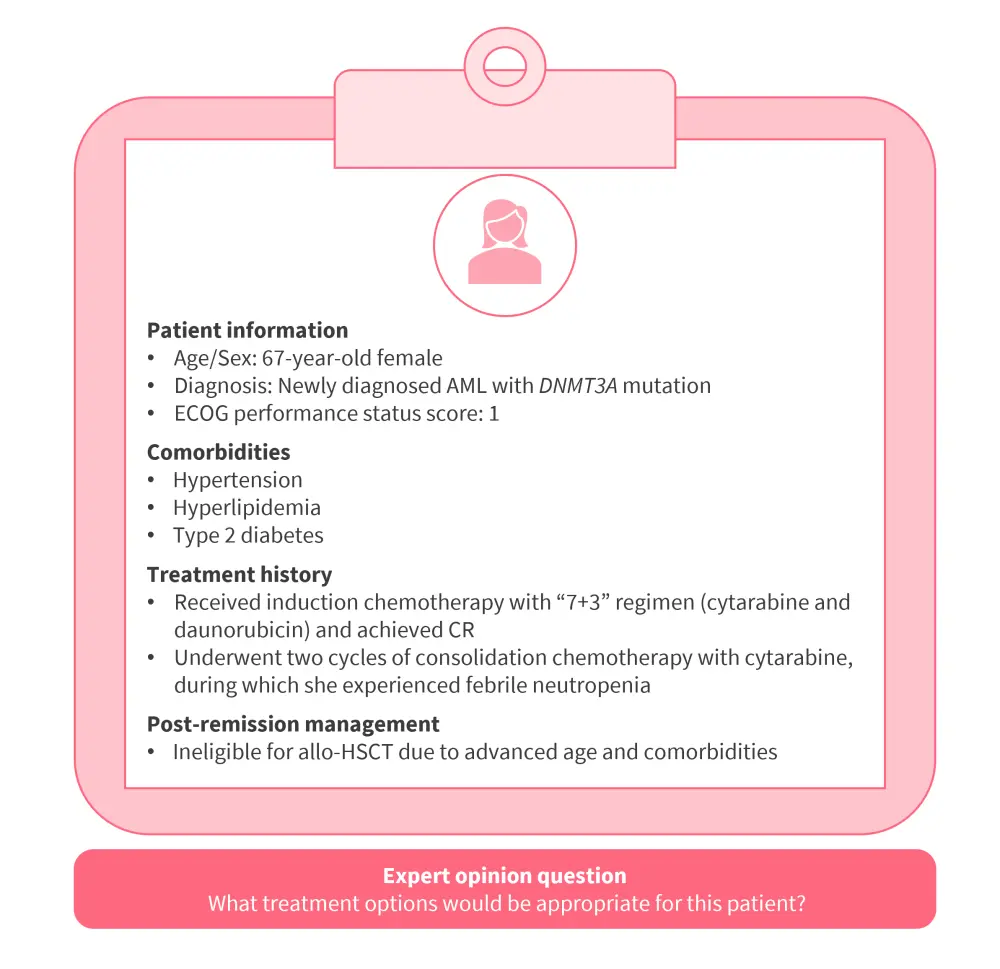All content on this site is intended for healthcare professionals only. By acknowledging this message and accessing the information on this website you are confirming that you are a Healthcare Professional. If you are a patient or carer, please visit Know AML.
The aml Hub website uses a third-party service provided by Google that dynamically translates web content. Translations are machine generated, so may not be an exact or complete translation, and the aml Hub cannot guarantee the accuracy of translated content. The aml and its employees will not be liable for any direct, indirect, or consequential damages (even if foreseeable) resulting from use of the Google Translate feature. For further support with Google Translate, visit Google Translate Help.
The AML Hub is an independent medical education platform, sponsored by Daiichi Sankyo, Johnson & Johnson, Syndax, Thermo Fisher Scientific, Kura Oncology, AbbVie, and has been supported through an educational grant from the Hippocrate Conference Institute, an association of the Servier Group.
Funders are allowed no direct influence on our content. The levels of sponsorship listed are reflective of the amount of funding given. View funders.
Now you can support HCPs in making informed decisions for their patients
Your contribution helps us continuously deliver expertly curated content to HCPs worldwide. You will also have the opportunity to make a content suggestion for consideration and receive updates on the impact contributions are making to our content.
Find out more
Create an account and access these new features:
Bookmark content to read later
Select your specific areas of interest
View AML content recommended for you
“How I treat” a patient with DNMT3A-mutated AML in remission post intensive chemotherapy
Featured:
Do you know... Among patients with AML achieving remission after intensive chemotherapy, which of the following is approved as maintenance therapy if not proceeding to allo-HSCT?
The AML Hub was pleased to speak with Cristina Papayannidis, Universitaria di Bologna, Bologna, IT. We asked, How do you treat a patient with DNMT3A-mutated acute myeloid leukemia (AML) in remission post intensive chemotherapy?
Figure 1. Case study presentation: Patient characteristics and treatment history

AML, acute myeloid leukemia; CR, complete remission; ECOG, Eastern Cooperative Oncology Group; HSCT, hematopoietic stem cell transplantation.
Papayannidis discusses a case of a 67-year-old female with DNMT3A-mutated AML who achieved remission following intensive chemotherapy. Her comorbidities and advanced age make her ineligible for allogenic hematopoietic stem cell transplant (allo-HSCT) and create a need for maintenance therapy options. Papayannidis recalls the key findings from the phase III QUAZAR AML-001 (NCT01757535) study, published by Wei et al.1 in the New England Journal of Medicine, evaluating oral azacitidine vs placebo in patients with AML ineligible for allo-HSCT. Papayannidis also reviews the post hoc subgroup analysis of this trial presented by Lopes De Menezes2 at ASH 2023, which evaluated the efficacy of oral azacitidine in various mutational subgroups, to guide her treatment approach. She concludes that, for patients not proceeding to allo-HSCT after chemotherapy, oral azacitidine is an important treatment option that is effective in all subgroups of AML, in particular in those with DNMT3A and SRSF2 mutations.
“How I treat” a patient with DNMT3A-mutated AML in remission post intensive chemotherapy
Listen to the podcast here:
“How I treat” a patient with DNMT3A-mutated AML in remission post intensive chemotherapy
Your opinion matters
I commit to consider the latest data on oral azacitidine maintenance therapy to guide my treatment of AML in clinical practice.
This educational resource is independently supported by Bristol Myers Squibb. All content is developed by SES in collaboration with an expert steering committee; funders are allowed no influence on the content of this resource
References
Please indicate your level of agreement with the following statements:
The content was clear and easy to understand
The content addressed the learning objectives
The content was relevant to my practice
I will change my clinical practice as a result of this content


 Cristina Papayannidis
Cristina Papayannidis

